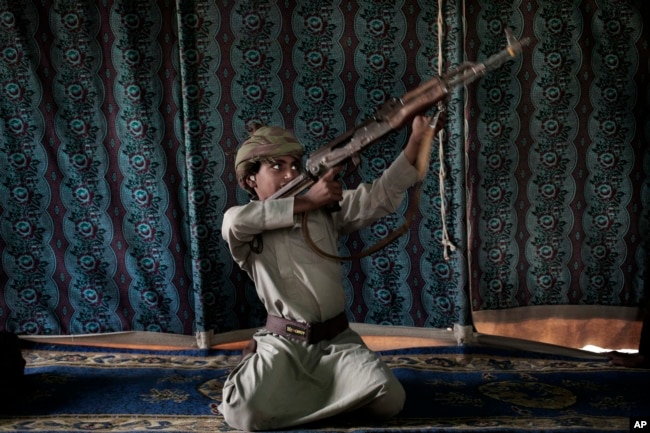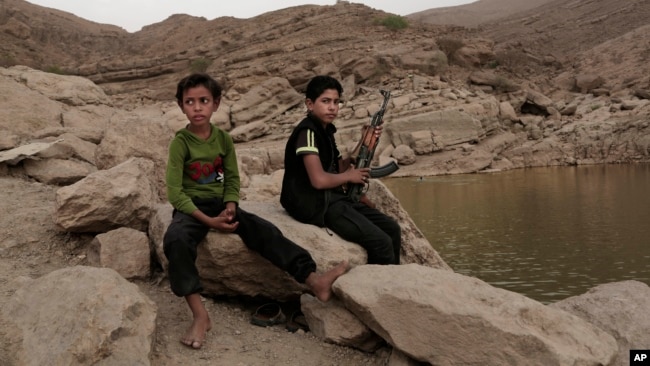イエメン、銃を構える10歳の兵士:飢餓がもたらす悲劇
紛争当事者は4月初め、6年ぶりの全面的な停戦合意。イスラム教の聖なる月であるラマダン(断食月)の時期に始まった2ヶ月間の協定。
イエメンのハーディ大統領は辞任し、新たな大統領評議会が暫定政権を運営し、フーシ派との交渉を担うと発表。サウジをはじめとする国々では、長年にわたって反フーシ派閥の内紛を抑えられなかった指導者の交代が歓迎しているが、フーシ派の報道官は一連の動きについて、”遠方でなされた非合法な決定”と断じて冷ややかな反応。ー と各種報道が伝えています。
生まれた時から戦闘態勢にある国に生きる子供の心を、私は想像できません。
宗教は心を癒すmedicineでもあり、如何様にも心を操れるpoison!!
VOAで英語を学びましょう
イエメンでは依然として子ども兵士が徴集されている(和訳)
Child Soldiers Still Recruited in Yemen
June 21,2022
イエメンの反政府勢フーシ派が、同国の内戦で戦うために子ども兵士を徴用していると報じられています。
反政府勢力は、4月に国連と合意した停戦協定の一環として、このような行為をやめると約束しています。
しかし、フーシ派の代表者、援助関係者、民間人によれば、協定が結ばれてから数週間の間に数百人の少年が徴用されたと言います。
ネット上で公開された動画には、イエメンの子どもたちに強力な軍用ライフルの部品について教える男の姿が映っています。
地元住民はAP通信に対し、このビデオは反体制派の支配地域であるアムランでここ数週間のうちに撮影されたものであることを確認しました。
フーシ派は、10歳や12歳の少年は男性と見なされると主張し、この習慣に何の問題もないと述べます。
彼らは”子どもではない。彼らは真の男性であり、サウジアラビアとアメリカの侵略から国を守るべきだ”と、フーシ派の指導者の一人は言います。彼は、匿名を条件にAP通信に語りました。
フーシ派は、宗教を教え、戦闘の訓練をするために”サマーキャンプ”と呼ばれるものを利用してきました。このようなキャンプは、イエメンのフーシ派が支配する地域の学校やモスクで行われます。フーシ派は、首都サヌアだけでなく、北部と中部の地域を押さえています。
イエメンの紛争は、2014年にフーシ派がサヌアを占拠したことから始まりました。そのため、政府は南部に避難せざるを得なくなったのです。2015年初頭には政府を政権に復帰させようと、サウジアラビア主導の軍事グループが参戦しました。
イエメンでの戦争は、世界最悪の人道危機の一つです。14,500人以上の民間人を含む、15万人以上が死亡しています。国はほとんど飢餓状態にあります。
子ども兵士は何年も前から関与しています。国連の専門家によると、2020年1月から2021年5月までの間に、フーシ派が募集した2,000人近くの子どもが戦場で殺害されたと言います。親政府軍も子どもの戦闘員を使ったことがありますが、はるかに少ない人数です。国連の援助関係者は、政府もこの慣行を終わらせるためにより大きな措置を講じてきたと述べています。
国連によると、全体で1万200人以上の子どもたちが戦争で死傷していると言います。しかし、殺されたうちの何人が戦闘員であるかは不明です。
4月、反政府勢力は、国連児童機関が児童兵士の徴集を停止するための”行動計画”と呼ぶものに署名しました。国連のステファン・デュジャリック報道官によると、反政府勢力は子どもの戦闘員を特定し、6カ月以内に解放することを約束したと言います。
反政府勢力支配地域で活動する3つの国際機関の4人の援助関係者は、ここ数週間、フーシ派が子どもをリクルートしようとする動きが増えていることを確認したと述べています。フーシ派は、特にマリブ市での約2年にわたる戦闘で、多くの損失を被っています。
援助関係者によると、反政府勢力は家族に圧力をかけ、子どもたちをキャンプに送り込んでいます。その見返りとして、彼らは国際組織から食料を含む支援を受けます。
アムラン州の住民2人によると、5月にフーシ派のメンバーが自宅を訪れたといいます。彼らは、11歳から16歳の5人の子どもたちに、学年末にキャンプに参加する準備をさせるように言いました。
その月の終わりには、子どもたちはビデオが撮影されたのと同じアムランの学校に連れて行かれたと、両親は話します。
ある父親は、子どもを送らないなら、家族はもう食べ物を受け取れないと言われたと言います。
あるフーシ派の指導者は6月上旬、収容所の一つを訪れた際に動画を投稿しました。そこには、軍服を着た数十人の子どもたちが軍隊のような隊列を組んで立っている姿が映っています。彼らは反政府運動の最高指導者であるアブドゥル・マレク・アル・フーシに忠誠を誓っていました。
Child Soldiers Still Recruited in Yemen
Houthi rebels in Yemen are reported to be recruiting child soldiers to fight in the country’s civil war.
The rebels had promised to stop the practice as part of a truce agreement reached with the United Nations in April.
However, hundreds of boys have been recruited in the weeks since the agreement was signed, reports Houthi representatives, aid workers and civilians.
A video released online shows a man teaching Yemeni children about the parts of a powerful military rifle.
Local residents confirmed to The Associated Press that the video was shot in the last several weeks in the rebel-held area of Amran.
Houthi officials said they see nothing wrong with the practice, arguing that boys from 10 or 12 are considered men.
These "are not children. They are true men, who should defend their nation against the Saudi, American aggression,” one Houthi leader said. He spoke to the AP on the condition of anonymity.
The Houthis have used what they call “summer camps” to teach religion and train in fighting. Such camps take place in schools and mosques in the Houthi-held areas of Yemen. Houthis hold areas of the north and center of the country, as well as the capital of Sanaa.
Yemen’s conflict began in 2014 when the Houthis took over Sanaa. That forced the government to flee to the south. A Saudi-led military group entered the war in early 2015 to try to put the government back in power.
The war in Yemen is one of the world’s worst humanitarian crises. It has killed more than 150,000 people, including more than 14,500 civilians. The country is in a near-famine.
Child soldiers have been involved for years. Nearly 2,000 Houthi-recruited children were killed on the battlefield between January 2020 and May 2021, U.N. experts say. Pro-government forces have also used child fighters but far fewer. U.N. aid officials say the government has also taken greater measures to end the practice.
Overall, the U.N. says over 10,200 children have been killed or wounded in the war. But it is unclear how many killed have been fighters.
In April, the rebels signed what the U.N. children’s agency called an “action plan” to stop recruiting child soldiers. U.N. spokesperson Stephane Dujarric said the rebels promised to identify children fighters and release them within six months.
Four aid workers with three international organizations working in rebel-held areas said they observed more Houthi efforts to recruit children in recent weeks. The Houthis’ have suffered many losses, especially during an almost two-year battle for the city of Marib.
The aid workers said the rebels have pressured families to send their children to the camps. In return, they receive assistance, including food, from international organizations.
Two residents in Amran province said Houthi members came to their homes in May. They told them to prepare their five children, ages 11 to 16, to attend camps at the end of the school year.
Later in the month, the parents said, the children were taken to the school in Amran, the same place where the video had been shot.
One father said he was told that if he did not send his children, his family would no longer receive food.
One Houthi leader posted a video in early June when he visited one of the camps. It shows dozens of children in uniforms standing in a military-like formation. They declared allegiance to the rebel movement’s top leader, Abdul-Malek al-Houthi.
Words in This Story
recruit — v. to find suitable people and get them to join a company, an organization, the armed forces, etc.
rifle — n. a gun that has a long barrel and that is held against your shoulder when you shoot it
resident — n. someone who lives in a particular place
truce — n. an agreement between enemies or opponents to stop fighting, arguing, etc., for a certain period of time
anonymity — n. the quality or state of being unknown to most people
mosque — n. a building that is used for Muslim religious services
famine — n. a situation in which many people do not have enough food to eat
dozen — n. a group of 12 people or things

